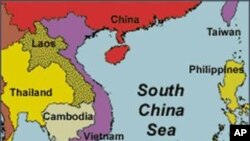A two-day meeting of Association of South East Asian Nations (ASEAN) legal experts in Manila has concluded that there is a legal basis for a proposal by the Philippines for joint economic development in disputed parts of the South China Sea. That conclusion flies in the face of China, which is not part of ASEAN and claims the entire sea.
The Philippine delegation at the ASEAN meeting submitted a plan that proposes creating what it calls a “zone of peace, freedom, friendship and cooperation” in the South China Sea. The idea is to isolate the islands that multiple countries are claiming, and jointly turn them into economically viable sites that all claimant nations can benefit from.
Apart from China and the Philippines, Vietnam, Malaysia, Brunei and Taiwan also have claims to the Spratly group of islands in the sea. Legal representatives from the three other claimant countries attended the two-day meeting.
Philippines Foreign Affairs Undersecretary Esteban Conejos led the delegation that presented the plan. He says the gathering strengthened the Philippines’ argument that the law is on its side.
“This meeting affirmed the importance of a rules-based approach. How do we define rules-based approach? Rules based on generally accepted principles of international law, including UNCLOS,” said Conejos.
UNCLOS, the United Nations Convention on the Law of the Sea, gives nations exclusive rights to exploit a 200-nautical-mile perimeter beyond their coastlines. The Philippines has adopted that position in response to what it claims were at least seven intrusions by China into its waters. One of its stronger complaints concerns a February incident in which Chinese naval vessels allegedly harassed an exploration ship in the Philippines' exclusive economic zone.
China has repeatedly said there were no intrusions into Philippine waters. It claims the entire South China Sea based on ancient records and a nearly 70-year old map. The sea is believed to be rich in oil and gas deposits, has an abundance of fish and is also one of the world’s busiest sea lanes.
Chinese officials were reportedly unhappy about the legal experts meeting in Manila. Chinese Foreign Ministry spokesman Hong Lei told reporters in Beijing Friday that the country is committed to solving the disputes through bilateral talks.
"We believe the most effective way to solve the dispute is for direct negotiations between the parties directly involved," he said. "The parties, including the Philippines, made clear pledges towards this end in the declaration made by the parties involved in the South China Sea. We hope these parties do more to contribute to regional peace and stability."
Hong is referring to a non-binding Declaration of Conduct of Parties in the South China Sea that China and the 10 ASEAN countries signed in 2002. It emphasizes peaceful and diplomatic means to resolve issues. In July, Southeast Asian and Chinese officials agreed on a set of non-binding guidelines for implementing it.
Philippine Foreign Affairs Undersecretary Conejos says the Philippines is the only ASEAN country that has submitted a proposal that will help resolve the disputes in the South China Sea.
The legal experts’ report will be submitted during the ASEAN senior officials’ meeting on October 11. The senior officials are then expected to make a recommendation regarding the proposal to the foreign ministers attending the annual ASEAN summit in November.
Philippine Plan for Joint South China Sea Development Has Legal Basis
- By Simone Orendain




